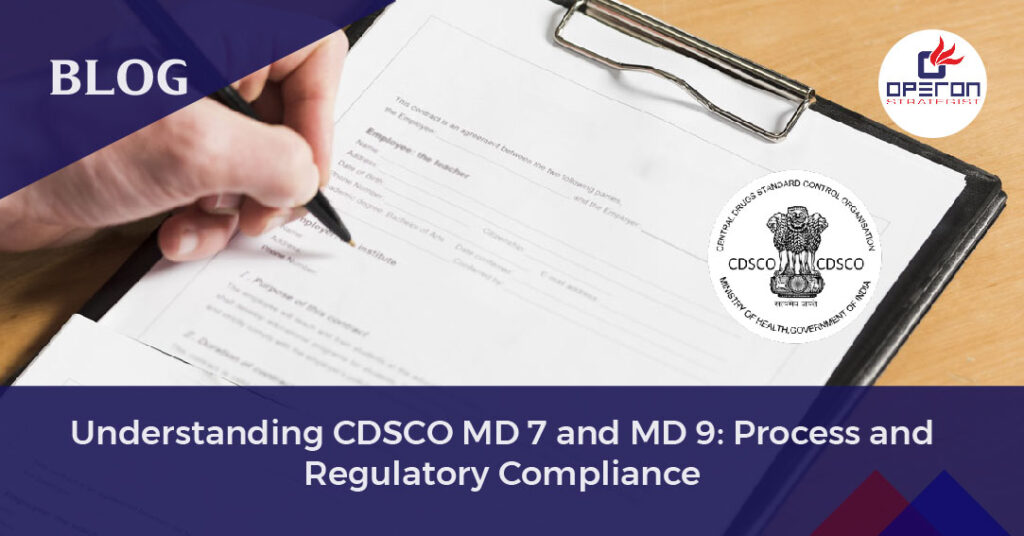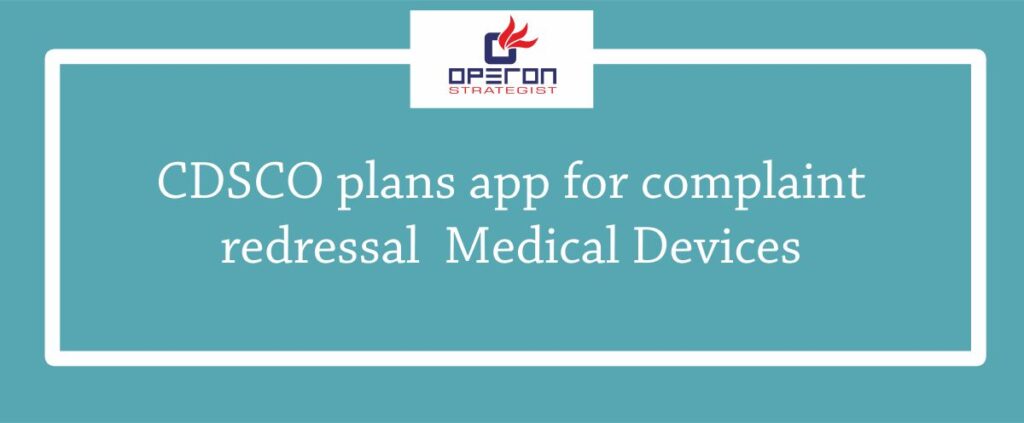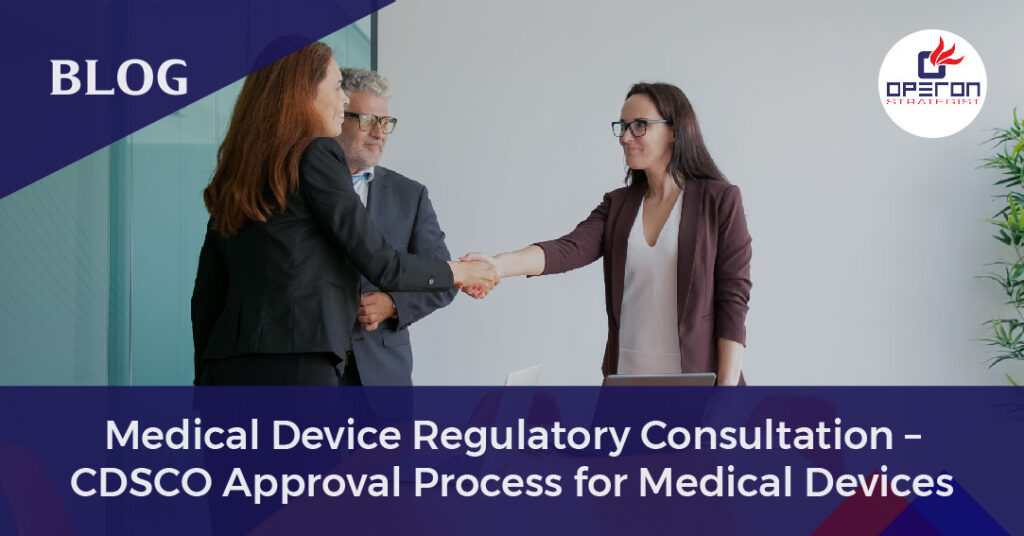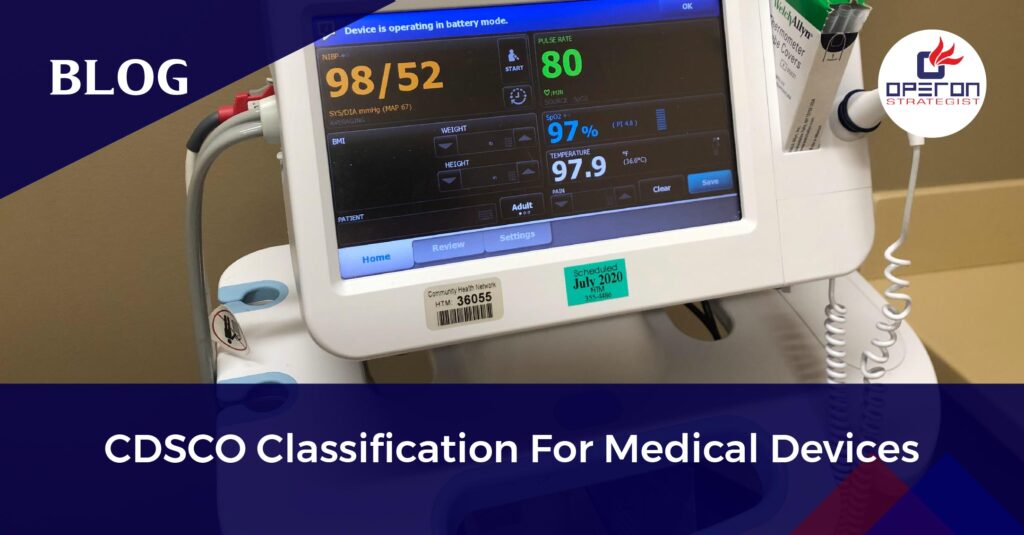Understanding CDSCO MD 7 and MD 9
The Central Drugs Standard Control Organization (CDSCO) regulates medical devices in India, ensuring they meet safety and performance standards. Within its framework, MD 7 and MD 9 are critical classifications that define how medical devices are categorized and approved for the Indian market.
Understanding and complying with CDSCO MD 7 and MD 9 requires regulatory expertise. Operon Strategist helps medical device manufacturers navigate this process with tailored compliance solutions whether you’re launching a product or setting up a new facility, we ensure a smooth and efficient market entry.
Looking For a Medical Device Regulatory Consultant?
What is CDSCO MD 7?
CDSCO MD 7 outlines the regulatory requirements for certain categories of medical devices. This framework is essential for manufacturers who want to ensure their products comply with Indian regulatory standards. The classification under MD 7 is designed to categorize devices based on risk levels and intended use, ensuring that they undergo appropriate scrutiny before approval.
What is CDSCO MD 9?
CDSCO MD 9 is another important regulatory framework that applies to different classes of medical devices. Like MD 7, it focuses on ensuring that medical devices adhere to safety, quality, and performance standards. The classification under MD 9 helps in determining the regulatory pathway for devices, which could range from simple registration to comprehensive clinical evaluations.
Read here about Understanding the Significance of FORM MD-3, MD-5, MD-7, and MD-9 in CDSCO
Get CDSCO Manufacturing License for Medical Devices
Classification of Medical Devices Under CDSCO
CDSCO classifies medical devices into different categories based on the risk associated with their use. These classifications generally fall into the following categories:
- Class A: Low risk (e.g., surgical dressings, stethoscopes)
- Class B: Low to moderate risk (e.g., hypodermic needles, suction equipment)
- Class C: Moderate to high risk (e.g., orthopedic implants, infusion pumps)
- Class D: High risk (e.g., heart valves, implantable defibrillators)
MD 7 and MD 9 frameworks guide the classification of devices within these categories, ensuring that the appropriate regulatory pathway is followed for each class.
Read more about CDSCO Classification of Medical Devices.
Process of Obtaining a Manufacturing License for Medical Devices in India
- Understand Regulatory Requirements:
Familiarize yourself with the Medical Device Rules, 2017, and the classification of devices (Class A, B, C, D) under CDSCO. - Set Up Manufacturing Facility:
Ensure the facility complies with Good Manufacturing Practices (GMP) and is equipped for quality production. - Prepare Documentation:
Compile necessary documents, including the Manufacturing Site Master File, Device Master File, and Quality Management System (QMS) documentation. - Submit Application:
Apply for the license through the CDSCO’s Sugam portal, submitting forms MD-3 and MD-5 along with the required fees. - Facility Inspection:
CDSCO will inspect your facility for compliance with GMP and regulatory standards. - Address Corrections:
Respond to any observations from the inspection by making necessary corrections and providing evidence. - License Issuance:
Upon successful inspection and review, CDSCO will issue the manufacturing license, valid for five years. - Post-Licensing Compliance:
Maintain compliance with ongoing audits, adverse event reporting, and timely license renewal.
License Validity
- The validity of Form MD–9 is for five years.
- If, in any case, the license gets suspended or canceled, then the applicant can apply within 45 days from the action date.
Role of Operon Strategist in Regulatory Compliance
As a leading medical device regulatory consulting company, Operon Strategist offers a comprehensive range of services to help manufacturers navigate the complexities of CDSCO regulations, including MD 7 and MD 9.
Turnkey Project Consulting
Operon Strategist excels in setting up manufacturing plants as a turnkey project consultant. This means they take responsibility for the entire project, from conceptualization to commissioning, ensuring that the manufacturing facility meets all regulatory requirements. Their expertise covers everything from plant layout design to obtaining necessary certifications and licenses.
Regulatory Compliance
Understanding and complying with MD 7 and MD 9 regulations is critical for medical device manufacturers. Operon Strategist provides end-to-end support in this area, including assistance with:
- Classification: Determining the correct classification of devices under CDSCO standards.
- Documentation: Preparing and managing all necessary regulatory documentation.
- Audit Preparation: Ensuring the manufacturing facility is ready for audits by regulatory bodies.
- Post-Market Surveillance: Offering guidance on compliance with post-market surveillance requirements.




